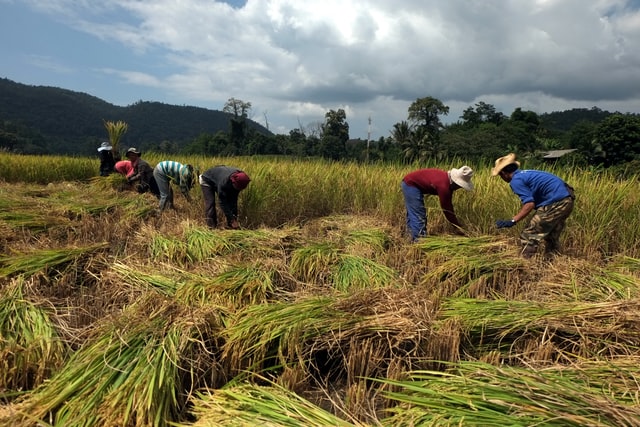Thailand’s economy took a huge blow over the course of the COVID-19 pandemic, as the country’s Gross Domestic Product (GDP) dropped by 6.1% in 2020 per reports from the International Monetary Fund (IMF). Despite the fallout caused by the pandemic, data from the IMF also suggests that Thailand’s economic future is trending upwards as the GDP is projected to rise by 2.6 % in 2021.
Given that the tourism sector accounts for 20% of Thailand’s total GDP and nationwide employment, Thailand will eventually look to bounce back in this regard, especially when fewer travel restrictions are imposed. While a third wave seems to be an impending threat, nevertheless, locals are diligently planning and looking to revitalize tourism through an unlikely approach: agriculture and rice production.
Recovering From Droughts
According to articles from Nikkei Asia and Bloomberg, Thailand has struggled in rice production over the past two years due to droughts. In addition to low rice production because of unfavorable weather conditions, Thailand’s rice exports also fell to a two-decade low due to expensive shipping costs and strong competition.
Although rice production has struggled mightily as of late, Thailand is expected to experience an uptick in rice production. Given the forecasted conditions of favorable weather and adequate water supply remain, the US Department of Agriculture (USDA) predicts a total output of 21 million tonnes during the marketing year of 2021-2022, a 17% increase compared to the total tonnes generated in 2020.
Connecting Through Organic Tourism
In relation to the revitalization of tourism and rice production, the Thai Organic Consumer Association (TOCA), in collaboration with the Tourism Authority of Thailand (TAT), will be launching a platform which connects consumers with a network of organic Thai farmers. By doing so, locals and inbound tourists alike will have direct access to knowledge of where organic rice may be purchased or consumed, whether at a hotel, restaurant, or market.
The implications of creating such a network could also unlock the potential of organic farms to become popular tourist attractions. Not only does such a development present tourists with an authentic Thai cultural experience, but the chance to become vital contributors to the country’s local economy. Currently, TOCA’s organic farming hub is in the Sampran district of Nakhon Pathom, but this project will look to create new hubs throughout various parts of Thailand as well.
Based on an article by Web in Travel, aside from being supported by TAT it is also reported that TOCA has received government support from the National Innovation Agency via means of a grant. Currently, TOCA’s pre-existing network spans a total of 4,000 members across 200 families, but given the supplied funding, the organization will look to build on that total. Beyond catering to locals, the eventual goal is to integrate tourists so that the platform benefits both the agricultural and tourism sectors.
The Emergence of City Farms
While domestic activities are largely focused on fortifying tourism and rice production, one local organization has instead looked to rice production as means to alleviate the difficulties presented by the COVID-19 crisis. As reported by the Bangkok Post, the Thai Health Promotion Foundation (ThaiHealth) has founded a project which aims to convert wastelands into agricultural food sources. This project will target low-income communities that have been largely impacted by the pandemic, specifically 30 high-risk areas throughout Bangkok, Pathum Thani, Samut Prakan, Chon Buri, and Nonthaburi.
By introducing the concept of Thai city farms, as well as training communities on how to properly farm, the disadvantaged local populace will now have access to a stable supply of healthy food. The project’s positive outcome is not only beneficial to individuals’ health, but also to the stagnant Thai economy. Given that ThaiHealth is successful in its venture, future implications may include the potential for similar projects to rise throughout Thailand.
For future updates and insights on how economies within Asia are looking to bounce back, subscribe to our newsletter here.


